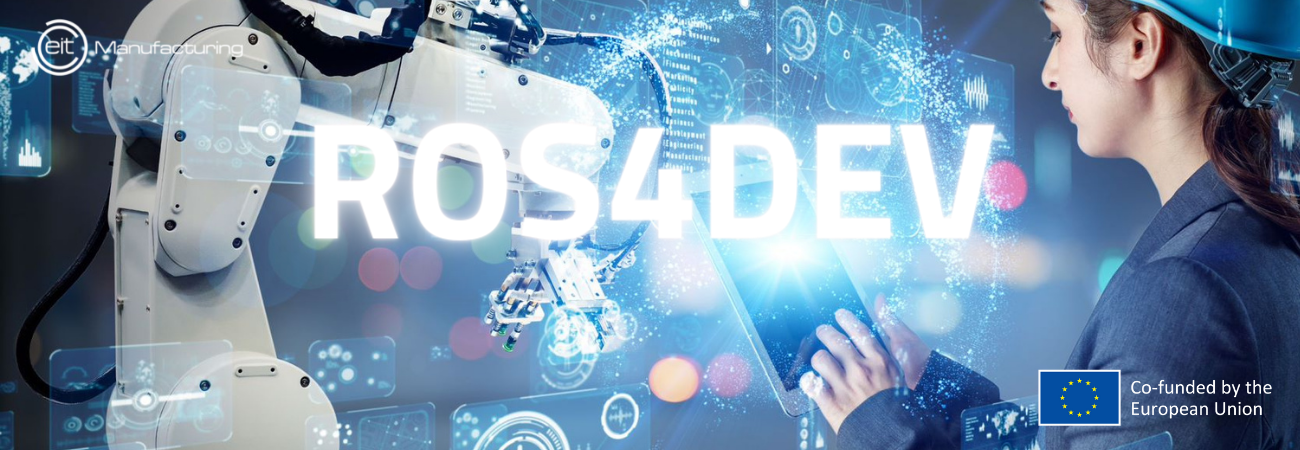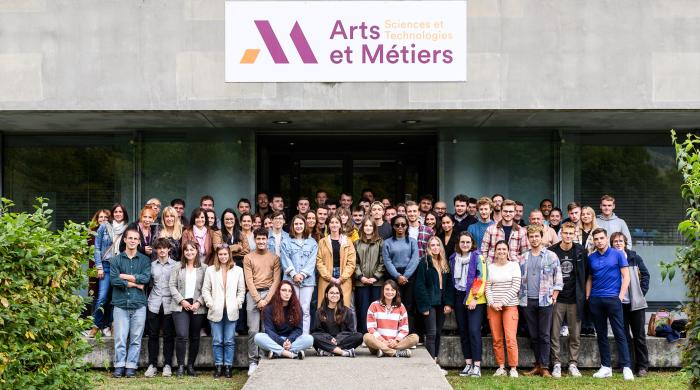
Building on the expertise of its consortium members, gathering experienced industrial and academic partners (Arts et Métiers Institute of Technology, University of Tartu, Alias Robotics, Joanneum Research), ROS4DEV is a flexible learning package for ROS solutions development in companies, startups, and SMEs using open source robotic software for manufacturing or robotics services.
Manufacturers need to have smarter, flexible, digitalised and collaborative facilities. ROS4DEV proposes flexible trainings on advanced topics of ROS solutions developments with frugal AI (low latency and low power processing), supervised learning, learning by demonstration, and cybersecurity software engineering methodologies (testing & deployment strategies).
This project is led by Dr Richard Béarée, Associate Professor in the LISPEN Laboratory (Lille Campus).
Robots programming made simple
Robotic Operating System (ROS) is a flexible and collaborative open-source framework for developing robotic software.
ROS provides a collection of tools, libraries, and conventions, to accelerate and simplify the creation of complex and robust robot functionalities across a wide variety of robotic platforms.
THE PROJECT
AI and robotics are seen as key factors to ensure continuous production during pandemics, European sovereignty regarding production automation, and to reduce the environmental impact of European factories. Thanks to its open-source community, interoperability and easy commissioning, ROS can be considered as a software lever to foster the development of current and future robotics applications.
Because of this, many SMEs in the European manufacturing industry have started using ROS. Engineers often have basic integration skills but require a more in-depth skillset to start making a true impact with reliable, secure and intelligent solutions. The ROS4DEV project intends to provide to engineers already developing ROS solutions in companies, start-ups & SMEs training content that fits their needs. Flexible trainings focus on advanced topics of ROS solution development with frugal AI (low latency and low power processing), supervised learning, learning by demonstration, and security software engineering methodologies like testing and deployment strategies.
- The 1st training stage will consist of an on-line adapted training using the nuggets developed during the E-ROS4PRO project and during the current project. The trainees will have access through the skills.move platform to learning paths (from basic presentations of ROS concepts to advanced presentations) customised to fit with their initial learning level and expected learning outcomes.
- The 2nd training stage will consist of organising 3 hands-on training sessions (1 in Estonia, 1 in Spain & 1 in Austria) around real use cases and problematics that ROS4DEV can solve.
Trainees are engineers already developing ROS solutions and graduates from the E-ROS4PRO project as the on-line program will provide them outcomes from different advanced ROS topics. The value of the trainings is the focus on use-cases relevant to thetrainees’ application domains.
OUR NETWORK
The ROS4DEV network associates two academic partners: Arts & Metiers Institute of Technology (France), University of Tartu (Estonia) ; a research institution, Joanneum Research (Austria) ; and one robotics cyber security company, Alias Robotics (Spain):
- JOANNEUM RESEARCH Forschungsgesellschaft mbH (JR) is an Austrian Research and Technology Organisation. The institute for robotics and mechatronics of JR is specialised in human-robot collaborations and flexible production processes with particular attention to robot safety and robot security as well as software- and systems engineering for robotic systems. JR contributes with its extensive knowledge in ROS security and know-how of developing production ready ROS applications for industry. Notably, JR operates a learning factory (hands-on area including stationary and mobile collaborative manipulators) that is integrated for practical trainings in the courses provided through its Robotics Training Center. As member of the ROS-Industrial consortium, JR is connected to technology leaders extending the power of ROS to the manufacturing sector.
- The University of Tartu is the oldest and largest higher education institution in Estonia and has been the centre of Estonian academic life for almost four centuries. It is ranked in the top 1.2% of the world's universities making it one of the leading universities in Northern Europe. 13 000 students and 3000 staff members study and work in a diverse range of fields connected by the power of curiosity. Research is conducted at the University of Tartu in the Faculty of Arts and Humanities, Faculty of Social Sciences, Faculty of Medicine and Faculty of Science and Technology. More than 1,000 researchers are employed at the 31 institutes of the university. This is where cutting-edge research is done, contributing through international cooperation to sustainable development and innovation.
- Alias Robotics is a world leading robot security firm, leveraging more than 10 years’ experience in the robotics industry. Their track record in robot cybersecurity includes relationships with more than 20 robot vendors and end users, including large robot end users, multinationals and governments. Alias Robotics is a ROS-Industrial member and an ECSO member.
All partners benefit from an environment rich in innovation and entrepreneurship, gathering incubators, national and European technological clusters and platforms. This environment of scientific and technological innovation is in permanent contact with start-ups and SMEs, thereby providing the excellence and complementarity required to anticipate the new challenges of European manufacturing.




